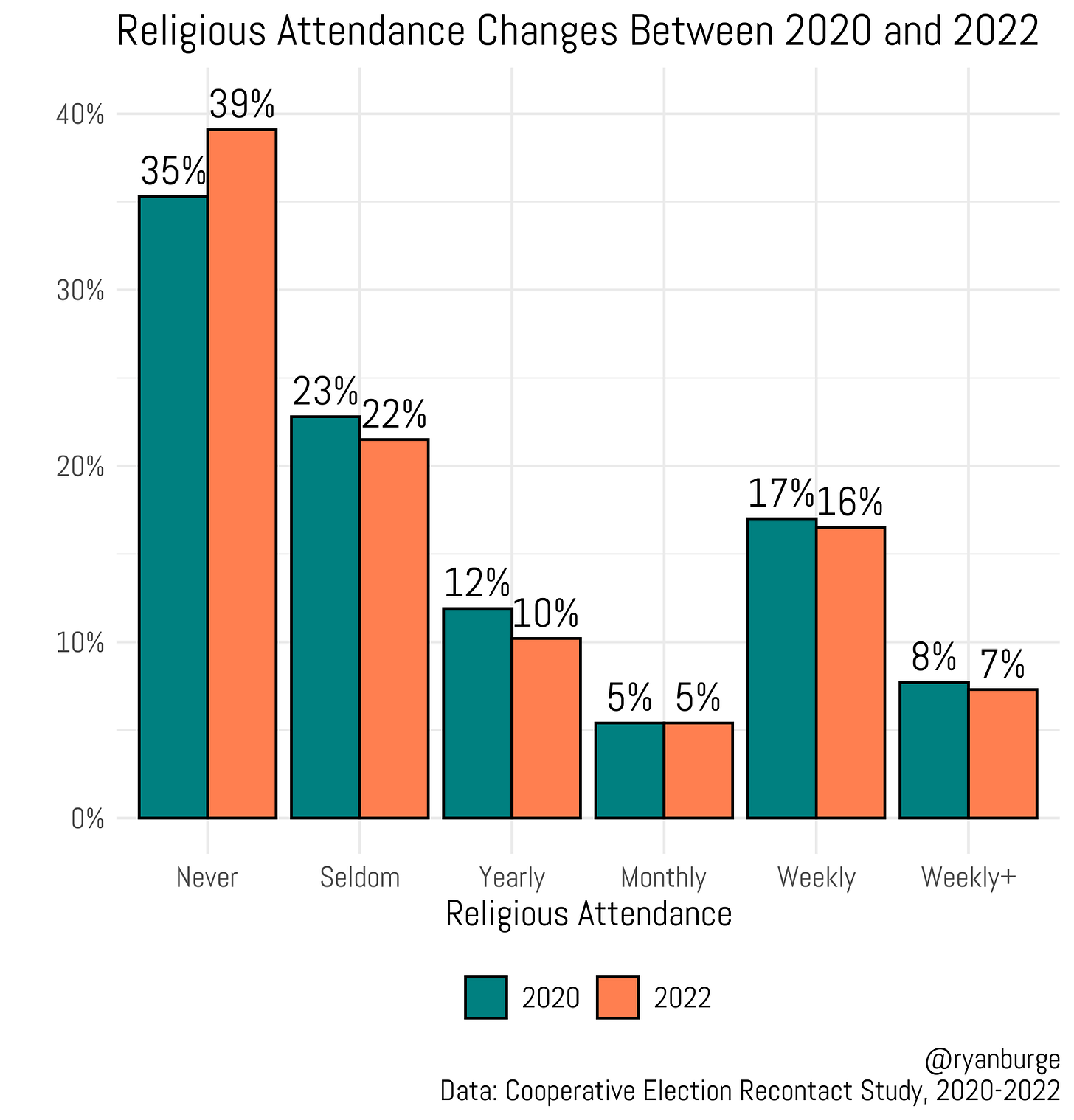In part IV of this series, we looked at the above graph, which showed that conservative women received less treatment for mental illness than liberal women — but not less than moderate women. This isn’t necessarily an artifact of better mental health; it’s the result of:
semantic taboos and word-games;
anti-scientific attitudes;
alternative treatment methods;
substitution of therapy for religious counseling,
and differential birth rates.
Religious People Are Weird
Religious people are, by definition, weird. Being weird could confer advantages:
It is weird to be a workaholic, and obsessed with achievement;
It is weird to take steroids for competitive bodybuilding;
It is weird to write hundreds of articles on Substack for $5,000 a year.
Being weird isn’t bad, but we should expect that people who do weird things are psychologically deviant. The weirder the behavior, the more likely that their personality deviates from the norm.
When I say “religious people,” I am using the term “religious” as a comparative. For example, if I said, “strong people,” I would be referring to a subset of the population who are stronger than average. I wouldn’t be referring to “all people with muscles in their body.”
Similarly, when I say “religious people,” I am not referring to all people who ever go to church or identify with a religion. I am referring to the 7% of Americans who go to church weekly. These are weird people.
Extremely conservative women are much more likely to be religious than extremely conservative men. This is because a much higher percentage of atheist and agnostic men are conservative on sexual or racial issues, like immigration.
Conservative Atheists are Mentally Ill
If we break each political affiliation down by religion, the link between politics and mental illness disappears for atheists, “other world religions,” and “nothing in particular.”
“Other world religions” (OWR) includes Buddhism, Hinduism, and Islam. OWR members are less likely to be white. Liberal members of OWR are less likely to be diagnosed with a mental illness than moderate members of OWR.
Conservative atheists were more likely to be diagnosed with a mental illness than liberal atheists.
For “nothing in particular,” conservatives were more likely to be diagnosed with mental illness than moderates.
Therefore:
The link between politics and mental illness only holds for Christians and agnostics.
For Christians, this is due to one or more of these four possibilities:
Mentally healthier people convert to Christianity;
Mentally ill people leave Christianity;
Christianity protects against mental illness;
Christianity hides mental illness.
Because very few people convert to Christianity, there are not enough conversions to explain the effect. It might be the case that all the mentally ill people are leaving the church, leaving the healthy behind. One way to test this would be to see if “de-converters” had a higher rate of mental illness. I think it is highly likely that Christianity does help people cope with mental illness. But less explored is the way in which Christianity helps to hide mental illness with semantic tricks.
How Christians Hide Their Mental Illness
Conservative Christians avoid the terminology of mental illness. Instead, they say, “I am struggling with a spiritual problem, and I need to speak with a pastor, pray, and read the Bible.” The religious are “attacked by demons” and seek “pastoral prayer,” while the secular “go to therapy for mental health.” Religious conservatives hide their mental illness by dressing it up in a different terminology. If we control for semantics, the difference disappears.
There is no difference between “being mentally ill” and “going to therapy” and “spiritually struggling” and “going to church.” In fact, someone who claims to be “spiritual struggling” may even be more mentally ill than someone with a diagnosis.
Schizophrenics, for example, may avoid or deny their diagnosis as a “lie from the devil,” and claim to be “demonically possessed” instead of “mentally ill.”
Does Church Hide or Heal Deviance?
Is church attendance a suppressant of mental deviance? Or is it an expression of mental deviance? Or both?
It is possible that church attendance helps mentally ill people cope with their problems. But the fact that conservatives are more likely to attend church should not be taken as evidence that they are less mentally deviant on a genetic or biological level. The contention that leftists are “spiteful mutants” does not hold up, since religious services are a coping mechanism for psychological problems. Conservatives are masking or coping with their mental deviance via religion.
A religious person can respond by saying, “it’s good that religion helps people with their problems,” but my point isn’t to bash religion. Rather, I am trying to refute the thesis that leftists are genetically or biologically inferior, or that leftism makes people more mentally ill. If conservatives report less mental health issues than liberals, but they also go to church more, then we shouldn’t assume that the difference in reported issues is biological, since it could be cultural or semantic.
Among conservatives, there is little correlation between church attendance and mental illness. The only group of conservatives who have lower rates of diagnosis are those who attend weekly, who are a very unusual group of Americans (7%).
Among moderates, there is no correlation between diagnosis and attendance, except for those who attend “never.”
Finally, among liberals, there is no strong correlation, except for those who attend weekly.
When we control for education, age, gender, income, and race, the political gap in mental deviance re-emerges:
Within each political coalition, church attendance did not produce a strong linear decline in diagnosis:
Liberals who went to church monthly were more diagnosed than those who went “never.”
Moderates who went to church weekly had similar rates of diagnosis as those who “never” went.
The only group where weekly church attendance produced a linear decline in diagnosis was conservatives, and the relationship was weak.
This indicates that conservative Christians, specifically, are an outlier among all groups. Their ideology uniquely suppresses diagnosis.
Anxious Christians Avoid Diagnosis
Ryan Burge tested the “conservatives avoid diagnosis hypothesis” as follows:
He asked participants whether they felt anxious or lonely. He then asked if they had ever been diagnosed with a mental illness. He divided participants into three categories: highly anxious/lonely; average anxious/lonely; low anxious/lonely.
What Ryan found was that, in each of these three categories, conservatives were much less diagnosed than liberals.
In the “low anxious/lonely” category, 10% of liberals were diagnosed, as opposed to 4% of conservatives.
In the “average anxious/lonely” category, 22% of liberals were diagnosed, as opposed to 8% of conservatives.
In the “high anxious/lonely” category, 36% of liberals were diagnosed, as opposed to 32% of conservatives.
If conservatives were more “mentally healthy” than liberals, we would expect that highly anxious/lonely conservatives would be just as diagnosed as highly anxious/lonely liberals. But this isn’t the case.
Anxious conservatives avoid diagnosis by refusing to seek treatment or hiding symptoms.
Conservatives stigmatize mental illness as a form of “weakness,” and view it as a betrayal of their conservative beliefs to rely on others for support. They are less comfortable being vulnerable and emotionally open.
Liberals, on the other hand, actively seek out support, even when they feel less anxious/lonely than average. Conservatives value independence, and feel that seeking treatment (outside of religion) is a form of dependence on others. Liberals value cooperation and interdependence, and are less likely to avoid seeking help from others.
Ryan’s data1 indicates that, even if religious conservatives avoid diagnosis, there still remains huge gaps between liberals and conservatives in anxiety and loneliness:
Religion does have a protective effect against nervousness, anxiety, and depression, with this effect being most pronounced among conservatives, less pronounced among moderates, and the least pronounced against liberals. In fact, church attendance generally made liberals more lonely: liberals who attended religious services “monthly” had more loneliness than those who attended “never.”
This may be due to cognitive dissonance. When conservatives go to church, they have their beliefs reinforced and strengthened, which is psychologically cathartic and empowering. When liberals go to church, they are more likely to have their beliefs challenged or questioned, which is psychologically aggravating.
For example, take a young woman who feels obligated to attend church services because of her family, but she is pro-choice, pro-LGBTQ, and pro-feminist. Every time she attends church, she is reminded of the gap in values between her worldview and that of her family. Similarly, conservatives report experiencing negative feelings while being forced to attend DEI training or sociology classes.
In Part VI, we will consider the effects of sexuality and family formation on mental illness.











Lol that’s never happening
Per The Myth Of Mental Illness, liberal ailments are not ailments when they result in benefits or society responding positively. And so on for conservative ailments.
Living in a liberal society means infinity pajeets, guatemalens, and bomalians. Living in a reactionary society means 15% less GDP per quarter. Which is worse overall?